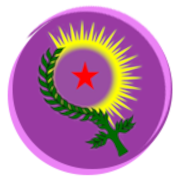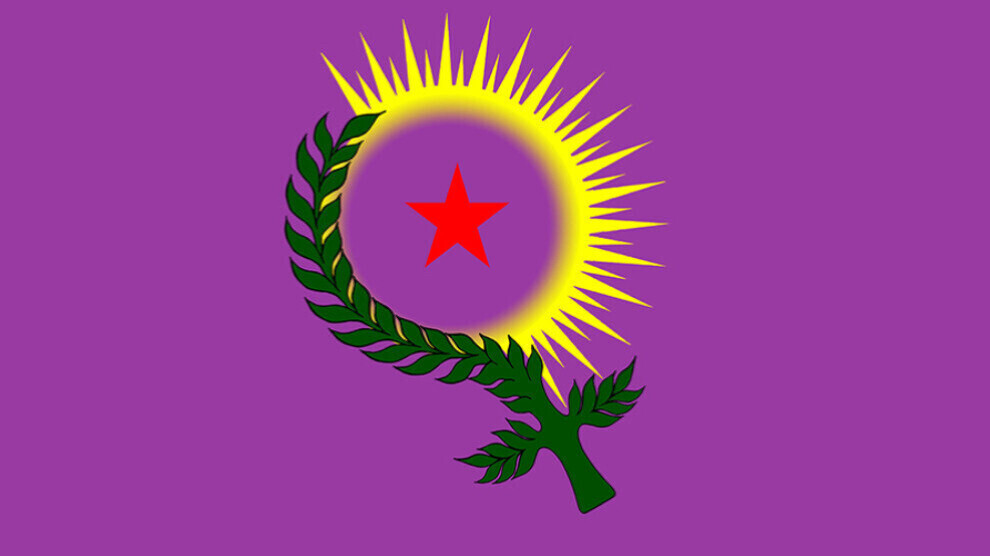KJK: Model of Mobilization
The KJK umbrella organisation is based on a democratic-confederal mode of mobilization. The women’s democratic and confederal model of grass-roots mobilization centres at its core notions of self-mobilization, self-agency and self-governance. This model has its foundations laid upon the communes, committees, academies and cooperatives.
The realization of women-specific societal needs, crises’ and problems can lead to novel models and techniques of mobilization to develop. It is possible to develop flexible and efficient models of mobilization dependent upon the context-specific requirements of the spaces in Kurdistan and the Middle East as well as that of other regions around the globe.
The local governance structures mobilize the sphere of the political, social, cultural, economic, ecological, educational, health, diplomatic, the press, the law, through committees. Through levels of mobilization, resolutions to the many issues that women face in various spheres are founded.
The KJK everywhere it is present builds its systems upon the notions of equal representation. This is achieved through systems which involve coordination, co-chairmanship, co-spokespersons and co-commanders.
All organisations under the KJK, work with a democratic criterion at their core. In order to democratize society, the democratization of politics and governance is required; to democratize governance structures, society is to be democratized. Mechanisms which facilitate the political agency of women within the political spaces are developed. Women, through the main principles of joint mobilization, authenticate their powers of protest. They [women] are ready to self-defend against threats to themselves as a group or their social existence.
The KJK develops foundational mobilization models through the communes, assemblies, academies and co-operatives:
A) COMMUNES:
The communes are like the cells that build up the confederal women’s system. It is the most ideal way in which women’s strength can be shared with society. Within the KJK system, nothing can occur without a commune. All individuals are, at least, a part of a single commune. Yet, an individual, dependent upon their skillsets and differences, can belong to several communes at any given time and exist. Everyone learns to live in a communal society in ways suited to their differences, to their skills and to their interests. The communes are integral to the women’s confederal model and are historically an example of being the eldest political and principle-based social unit.
B) ASSEMBLIES:
Another core component of mobilization within the women’s confederal system are women’s assemblies. Women, through assemblies, can learn under the principles of a culture of democracy, how to become educated mobilized forces through the first-hand experience of their self-structuring. 60% of women’s assemblies consist of members from normal society and the remaining 40%, from existing mobilized structures. It is through a step-by-step formation of committees that the women’s assemblies mobilize. Women’s assemblies cover a large variety of differing identities.
C) ACADEMIES:
Academies represent the institutionalization of the women’s intellectual revolution. The academies are responsible for the regular practice of education and learning and democratic debating culture. The academies work on the development of activities which open the condition of the woman’s nature and truths of the woman’s condition within the realm of history and society. The academies engage in restoring the matriarch culture destroyed thousands of years ago. By exploring examples from different societies and the historical experiences of females from around the world, lessons are learned with integrated to the objectives of the women’s confederal system in establishing local-universal academies.
D) COOPERATIVES:
The cooperatives play a significant role in the economic practicalization of mobilization through the development of a communal economic model. This model of mobilization centres at its core the involvement of women and youth. The cooperatives can affect and have answers to women’s socio-cultural needs on all levels. The KJK considers human capital as most powerful form of strength. Therefore, the cooperatives are developed in a way to eradicate the tragedies faced by women seasonal workers; the exploitation of women in the workforce in general, and the unrecognized labour of motherhood and housewifery.
E) COMMITTEES:
To materialize the projects, activities and ideas that are developed through the communes and assemblies, committees are formed. The committees work in close relation to the assemblies. Depending upon needs, the committees mobilize based on cooperation, associations, foundations, networks, movements and initiatives. Committees are formed on the thematic of social, political, economic, legal, culture, expression, democratic relations and unisons, religions and beliefs, self-defence, local governance, ecology, social education, social health and demography.
- Social Committee
This committee develops the woman’s social network mobilization. Interventions and projects to assist the civil society space (human rights, peace, sports, beliefs, trade unions, children and the disabled) are developed and thought about. - Political Committee
This committee is responsible for the institutionalization and development of political democracy for women. The committee comes together with women’s organisations to develop visions in which to overcome issues facing women. Mechanisms are developed within political parties to facilitate the women’s role in politics and work towards ensuring that this happens. Ways to work towards Kurdish national unity are also identified and carried through. - Ecological Committee
Activities and projects are developed based upon a socio-ecological consciousness followed through with efforts which materialize based on specific needs. The town-village axis is developed through the lens of ecology. The aim is to pursue the fight against ecological destruction caused by capitalist modernity and industrialization. Ways to strengthen consciousness of a rich ecology are pursued through. To do this, the educational mobilization of women and children as well as society in general in takes places. - Communal Economy Committee
By creating the woman’s communal economic consciousness and understanding, this committee mobilizes economic activity which makes visible women’s labour. Resources are created based upon agriculture. In opposition to the competition and greed caused by capitalism, local economic planning and markets are given heavier consideration. - Health Committee
This committee type seeks to overcome the health-related issues that women have and leads efforts in forming and supporting women’s health institutions. Protective activities of the mother and child are prioritized. An understanding of social health that is not based on profit but on the building of a social consciousness is built. - Education Committee
This committee is responsible for the development of an understanding of the democratic nation and ideology. With Kurdish at its forefront, all mother-tongues are to be treated as heritage to be kept alive and mobilisation efforts in their reading, writing and speaking are to be pursued. - Press Committees
Tools to materialize a press understanding based upon a paradigm of democracy, ecology and the freedom of women are, always, to be pursued through this committee. This committee will fight against the nationalist, sexist and homogenous tones within the press which overtake the right to access and produce objective reporting. - Culture and Arts Committee
This committee works to undo the settled pro-government and sexist cultural forms of cultural genocide. It seeks to sustainably surface the woman’s democratic cultural values and work to mobilize them continuously. The committee works towards cultural and art activities/projects with the ethical and aesthetical consciousness of female enlightenment. - Democratic Relations and Alliances Committee
This committee develops itself by focusing on mobilization techniques to develop women’s confederalizm and women’s diplomacy. Diplomacy is developed by having its foundations based on the strength and power of society and the needs of society. Women lead democratic socialism from an anti-capitalist, anti-fascist, anti-government, anti-industrialization standing to establish and develop individuals’ relationships with ecology against capitalist modernity. This committee seeks to build relations and make world known Jineology (the science of women) and ideology of female emancipation. - Legal Committee
This committee is responsible for the ethical and political consciousness of society’s understanding of law and order. Through civil society groups, the committee strives to work in a fight against the expropriation of women’s rights and supports tools to democratically institutionalize. A multilateral legal system is sought to be created which works both nationally and internationally. - Local Governance Committee
This committee develops democratic communal local governance structures based on notions of ecology, economy and women’s freedom. The committee leads the efforts in the mobilization of a democratic self-governance consciousness. The committee strives to distance local councils from the usual state institutionalization that it is often used to and to become a vehicle for society to act and have a voice for itself with agency. The committee will be in touch and in communication with local councils both national and internationally with regards to female mobilization. The councils will work on a system of co-chairship and have a representative system in place. - Self Defence Committee
This committee develops self-defence as a mobilization technique against the pro-ruling government, patriarchal system which threatens the existence of women. By developing the consciousness of self-defence, the committee seeks to institutionalize women’s defence against all forms of injustice, inequality, violence, rape and femicide. By starting from the local level through the communes, self-defence committees are developed in all assemblies and are mobilized dependent upon need.

